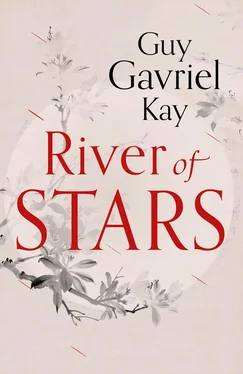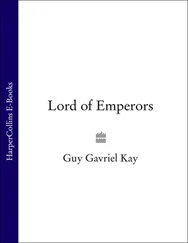Zhao Ziji looked at him. A life, he thought, could change quickly. It could turn like a water wheel on some isolated hilltop in summer heat.
“That’s what you are doing?” he said, perhaps too wryly for someone facing an arrow. “Sending memoranda to the emperor?”
“Some go into the woods for money. Food. Some for a life of freedom. Some like to kill. I’m … some of us are also trying to say something, yes. Enough voices, we might be heard.”
Ziji looked at him.
“What is your name?” He wasn’t sure why he asked.
“Ren Daiyan,” said the other, promptly. “They call me Little Dai.”
“You aren’t so little.”
The other man grinned. “I was young when I started, west of here. And besides, I have a small cock.”
The others burst into laughter. Ziji blinked. A strange sensation came over him.
“Is that so?” he said.
“Of course not!” one of the outlaws cried. Someone made a loud, crude jest, the kind Ziji knew from soldiers in barracks too long without women.
Something altered inside him, as if a key had turned in a lock. “I’m Zhao Ziji,” he said. And, for the first time in his life, added, “They call me Ziji Shortcock.”
“Truly? Ho! We were born to be companions then!” cried the man named Ren Daiyan. “ To seek women and wine and live forever! ” Words from a very old song.
In the laughter that followed, Zhao Ziji stepped into the roadway and became an outlaw.
He felt, astonishingly, as if he were coming home. He looked at the young man—Ren Daiyan was surely ten years younger than him—and knew, in that same moment, that he would follow this man all his life, until one or the other or both of them died.
She has made herself wait before trying again, striving for inner harmony, sitting very still at her writing desk. The first three attempts at the letter have been unsatisfactory. She is aware that tension, fear, the importance of what she is writing are affecting her brush.
That must not be permitted. She breathes deeply, eyes on a lotus tree she’s always liked in the courtyard. It is very early morning, autumn. Outside her window the compound is quiet, even with the extreme crowding in the space assigned the imperial family members.
She is alone in their house. Her husband is away, north, in search of steles to buy or transcribe, bronzes, artifacts for their collection. It is a collection now; they are becoming known for it.
Qi Wai is travelling near the border again, towards the lands possessed (for a long time now) by the Xiaolu. It ought to be all right. They are at peace—a peace they buy each year. Her husband’s father has told them that most of their silver comes back in trade at the authorized border trading towns. He approves of the payments, though if he did not he wouldn’t say so. Members of the imperial family live watched, careful lives.
In dealings with the Xiaolu, the Kitan emperor is still the “uncle,” the emperor of the Xiaolu is his “nephew.” The uncle kindly gives “gifts” to the nephew. It is a fiction, a courtly lie, but lies can be important in the world, Lin Shan has come to understand.
The world is a terrible place.
She chides herself, inwardly. Bitter thoughts will not bring calm. She ruined her first attempt at the letter not only with an anxious brush but with a tear that fell on the page, making the strokes for the word councillor blur and run.
On the desk are the Four Treasures of the Room of Literature: ink stone, ink stick, paper, brushes. Her husband brought her back a red ink stone, offered it as a gift at the New Year’s Festival. It is beautiful, old, Fourth Dynasty, he thinks.
For this letter, though, she is using her own first ink stone, from childhood. The one her father gave her. There might be, she thinks, some magic residing in it, a spiritual power to make the ink it grinds more persuasive.
She needs it to be, or her heart will break.
She takes up her stick again, pours water from the beaker into the ink stone’s hollow. Gestures she has performed all her life, rituals by now. She grinds the black ink stick into the stone, using her left hand as she has been taught (by her father).
She knows exactly what she wants to say in this letter, how many characters, how much ink she needs. You always grind a little more than you need, she has been taught (by her father). If you are forced to grind again, in order to finish, the texture at the end of your writing will be different from the beginning, a flaw.
She sets the ink stick down. Lifts the brush in her right hand. Dips it in the ink. She is using the rabbit’s-hair brush for this letter: it makes the most precise characters. Sheep’s hair is more bold, but though she needs the letter to seem confident of its virtue, it is still a plea.
She sits as she must sit. She adopts the Pillowed-Wrist Position, left hand under right wrist, supporting it. Her characters are to be small, exact, not large and assertive (for which she’d have used Raised-Wrist Position). The letter will be in formal hand. Of course it will.
A writer’s brush is a warrior’s bow, the letters it shapes are arrows that must hit the mark on the page. The calligrapher is an archer, or a general on a battlefield. Someone wrote that long ago. She feels that way this morning. She is at war.
Her brush is directly above the paper, vertical. Each finger plays a part. Her grip is firm; the strength of arm and wrist must be controlled and sure.
Controlled and sure. It is imperative that she not weep. She looks out the window again. A single servant has appeared, is sweeping the courtyard in morning light. Another brush, a broom.
She begins.

His eyesight had become the important difficulty. He didn’t sleep easily these nights, and he didn’t walk as he used to, but what old man did? Too much wine gave him headaches, beginning while he drank, not even waiting politely for morning. Such sad things were part of what time did to men when the hair turned white and the sword arm failed, as a poet had written.
The prime minister of Kitai had never had a sword arm. The very idea was, briefly, amusing. And senior court officials didn’t walk very much (or at all) within the palace or outside it. He had a cushioned, covered, ornately gilded chair and bearers to carry him where he needed to go.
And he could destroy people without touching a blade.
No, the infirmity that mattered was his sight. It was reading letters, tax records, prefectural documents, memoranda, reports from informants that had become a challenge. There was a cloudiness at the edge of each eye now, creeping inwards like mist over water, approaching the land. You could make that image a symbol for a poem, but only if you wanted to let others know this was happening, and he didn’t. It wasn’t safe.
His son helped him. Hsien seldom left his side, and they had tricks to conceal his trouble. It was important at this court not to be seen as so aged and frail one couldn’t even read the morning’s civil service documents.
He half believed that some of those who’d be happier if he was gone had taken to using deliberately small calligraphy, to show up his difficulty. It would be clever if they were doing that, the sort of thing he might have done himself once. He lived under few illusions. Emperors were capricious, unstable. Power was not a dependable condition.
Hang Dejin, still prime minister to the sage and illustrious Emperor Wenzong, often thought of retiring.
He had asked the emperor for permission to do so many times over the years, but those had been ploys, a public stand in the face of opposition at court. If the emperor in his wisdom thinks his servant is misguided, I beg leave to withdraw in shame.
Читать дальше













